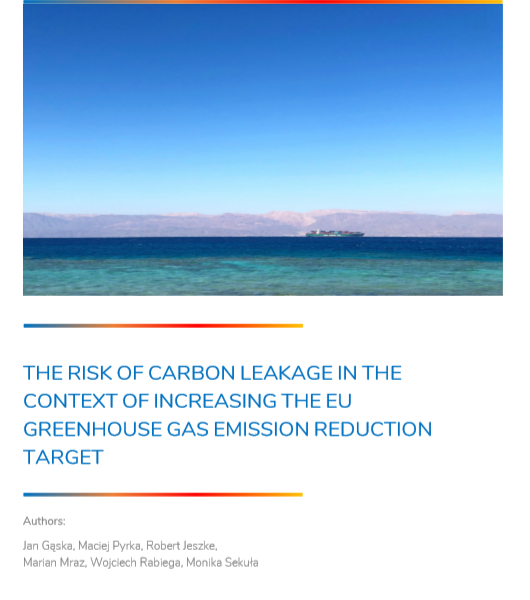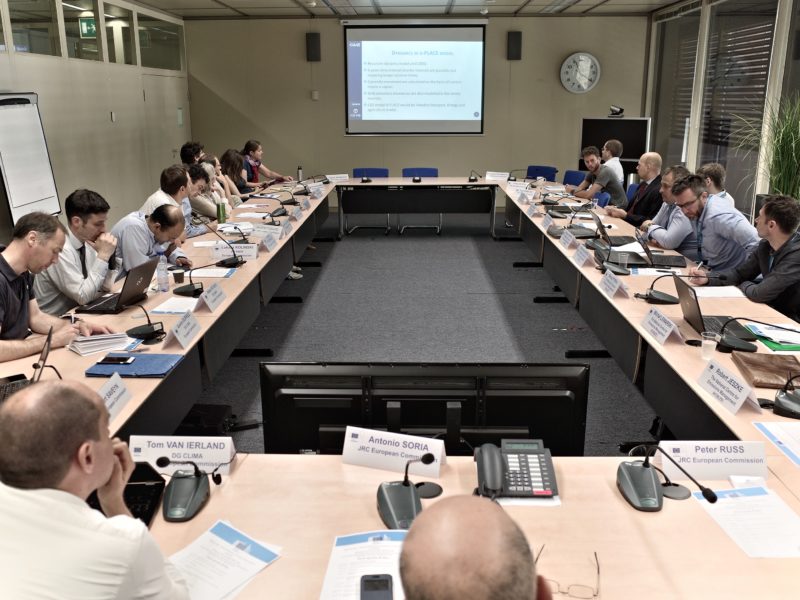
We are pleased to present the results of the first analysis prepared within the LIFE Climate CAKE PL project, based on d-PLACE model titled “The Risk of carbon leakage in the context of increasing the EU greenhouse gas emission reduction target”. The publication consist of two documents – Full report in English language and Summary which is available in polish language.
The purpose of publication was to assess the possible scale of the carbon leakage using various assumptions and policy scenarios, including the impact on emission levels, GDP and the functioning of economic sectors.
Based on the results of the analysis it should be concluded that carbon leakeage may limit the effectivness of EU climate and energy policy implementation and thus affect the overall volumes of emissions as well as affect the functioning of the economy, industry and the level of well- being in countries with tight reduction targets. Based on the results of the analysis, it can be concluded that the carbon leakeage outside the EU should be seen as an important problem that may affect EU Member States whose energy mix is based on fossil fuels (including Poland) and energy-intensive sectors, i.e. the steel, mineral and chemical sectors.
According to the analysis:
Preliminary results of the analysis were presented among others during COP24 in Katowice and at the meeting of the Steering Committee in December 2018 and this year at the Joint Research Center (JRC) workshop in May in Seville as well as at the GTAP conference in June 2019 (22nd Annual Conference on Global Economic Analysis, University of Warsaw Warsaw, Challenges to Global, Social, and Economic Growth in Warsaw).
 The risk of Carbon Leakage in the context of increasing the EU Greenhouse Gas Emission reduction taget (3.2 MiB, 2,667 hits)
The risk of Carbon Leakage in the context of increasing the EU Greenhouse Gas Emission reduction taget (3.2 MiB, 2,667 hits)
 Podsumowanie raportu Ryzyko ucieczki emisji w kontekście zwiększenia celu redukcji emisji gazów cieplarnianych UE (849.6 KiB, 2,280 hits)
Podsumowanie raportu Ryzyko ucieczki emisji w kontekście zwiększenia celu redukcji emisji gazów cieplarnianych UE (849.6 KiB, 2,280 hits)

On the 28th – 29th of May 2019 in Seville as a part of the implementation of LIFE Climate CAKE PL project a bilateral expert workshop on modelling between CAKE (Center for Climate and Policy Analysis) and the European Commission represented by the Directorate-General for Climate Action (DG CLIMA), Directorate-General for Energy (DG ENER) and the Joint Research Center (JRC – Joint Research Center) took place. About 20 modelling experts in energy and climate policy, as well as in transport and adaptation attended the meeting.
The meeting was organized in order to:
Experts from LIFE Climate CAKE PL and Joint Research Center emphasized that analytical tools which are being developed significantly contribute to the dissemination of knowledge about the neces
sity of the reduction of greenhouse gas emissions and the need to undertake necessary actions on climate protection in the perspective up to 2050.
Moreover the workshop gave an opportunity to present model assumptions and model tools developed as a part of LIFE Climate CAKE PL.
During the meeting, the important role of modelling results in the decision-making process by the administration were underlined and experiences of accessible forms of presenting model results were discussed. LIFE Climate CAKE PL experts presented the CGE d-PLACE model, the MESSA energy model and the TR3E transport sector model. In addition, preliminary results of the analysis concerning the effects of carbon leakage performed with d-PLACE model were showed. Carbon leakage is the result of the diversification of climate policy actions carried out in different parts of the world what can affect the competitive position of various EU industries. The analysis made by CAKE experts was aimed to shown the possible scale of carbon leakage, with the assumption of different GHG emission reduction scenarios in the EU and identification of carbon leakeage channels which could allow for more effective prevention of this phenomenon in the future.
Experts from Joint Research Center discussed some of the developed tools e.g.,:POTEnCIA, PIRAMID, T-NET model, as well as the model for evaluation of the impact of climate change on Peseta’s economy. Moreover, the Integrated Database of the European Energy Sector (IDEES) that is used, among others, in the POTEnCIA model at Joint Research Centre (JRC) were presented. It is worth to be noted that the IDEES database is also used in the transport model in the LIFE Climate CAKE PL project and in the future it may become an important source of historical data for other models.
It should be emphasized that the exchange of knowledge and experiences between the Center for Climate and Policy Analysis (CAKE) and representatives of Joint Research Centre (JRC) provided an opportunity to get to know broader perspective of the ongoing works as well as current and future analytical challenges in the area of climate protection. Furthermore, experts of the LIFE CAKE PL team have particularly benefited from the experiences of JRC by familiarizing with the technical details of the tools, which would allow to improve the quality of created models. This acquired knowledge will be used in the further work of the LIFE Climate CAKE PL team in the CGE, transport and energy models.
On the 9th of May 2019 in Serock we took part in an event „Cities and municipalities as leaders in climate and energy activities” organised by Stowarzyszenie Gmin Polska Sieć „Energie Cités” where the latest initiatives (Covenant of Mayors for Climate and Energy), funding opportunities (NFOŚiGW) and examples of implementations of green solutions in cities (Bydgoszcz, Warsaw, 44MPA project) were presented. During the table session, we presented the scope of LIFE Climate CAKE PL and discussed needs of local administration in case of project deliverables.

On December 20, 2018, a second meeting of the Steering Committee and the Technical Group took place as part of the LIFE Climate CAKE PL project.
The meeting was attended by representatives of the central administration interested in the project’s results. The project team presented the current state of work and the results of the first analysis, on carbon leakage, prepared as part of the project. In addition, further topics to be analysed were discussed.

On the 10th December 2018 during the COP 24 UNFCCC United Nations Framework Convention on Climate Change in Katowice in Poland two side events by Climate CAKE PL project were organized.
At the first side event LIFE Climate CAKE PL project concept and attitude to the challenge and goals identified were presented to the wider audience, as it was convened in the Paris Committee on Capacity-Building Hub (PCCB) side events, so it was realized in the framework of the wide range of activities of the Climate Change Convention.
During the second side event which was organized in the Polish Pavilion during the Climate and Finance Day the Team of LIFE CAKE PL had the opportunity to present the first draft project outcomes on the analysis concerning carbon leakage – that refers to relocation of economic activities or investments, directly or indirectly causing greenhouse gas emissions out to countries under jurisdiction with less stringent policies concerning reduction of greenhouse gas emissions.
The Coordinator of the project presented main objectives and scope of the LIFE Climate CAKE PL project defined as „the development of a sustainable and comprehensive system in order to suport the process of decision-making within the public administration and building a comprehensive and consistent analytical toolkit, that would provide relevant and high quality knowledge”. Project was presented also from the capacity building stream perspective by Mr. Maciej Cygler, who underlined that „knowledge, experience and specialized tools play an important role in the implementation of the goals of the project, in order to response to the needs identified from various stakeholders involved in the creation of the climate and energy policy”. Mr. Maciej Pyrka stressed that „project had a great importance due to the models which are developed according to the present challenges on low emission transformation” and described in details the basis of analysis of this phenomenon. Mr. Jan Gąska infomed that „there are examples of linking the CGE models with transport, energy and agriculture models, this is the first that aims to integrate in one consistent framework the capabilities and potential of that models”.
The second event was focused on the demonstration of the first draft results concerning the carbon leakeage analysis. Mr Robert Jeszke underlined that „as far as in the broad sense carbon leakeage is described as as a situation which may occur, when as a result of incresed costs caused by the implementation of climate and energy policies, companies would decide to shift production to other countries with less stringent emissions targets, apart from the economic aspects it should be noted that this action can lead to the increse of the global emissions. The risk of carbon leakeage may be much higher in some energy- intensive sectors. The proper understanding of the carbon leakage phenomenon is the key in order to design the relevant and effective political reaction”. Mr. Jan Gąska noticed that „in order to reduce the risk of carbon leakeage we need not only to support competetivness of specific sectors prone to carbon leakeage in the European Union, but also support the decrease of the emission intenisty of the sectors from outside of the EU by supporting the transfer of the relevant clean technologies”. Aditionally Mr. Marian Mraz stressed that „even if there is no strong empirical evidence studies based on historical data for the existence of carbon leakeage, economic models estimates that the scale of carbon leakeage can range between 2% and 130%, dependent on the assumptions adopted”.
Participation in the COP 24 Climate Conference was an unique opportunity for the LIFE Climate CAKE PL where the first draft results of the project were presented and a range of contacts with other climatic stakeholders were established.
More information at the UNFCCC website.